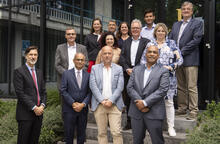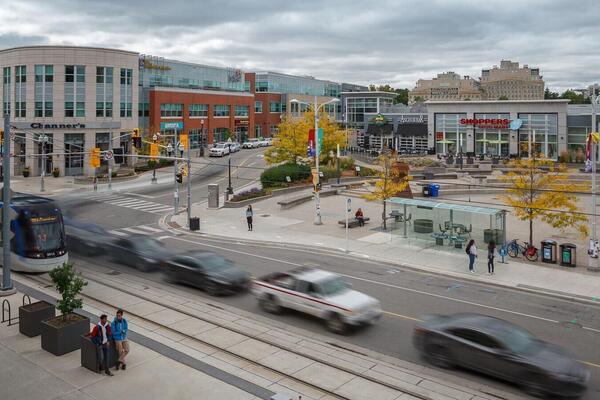
Strengthening Waterloo’s global collaborations
As world travel opens up again, President Goel reflects on the importance of international partnerships

As world travel opens up again, President Goel reflects on the importance of international partnerships
By Vivek Goel President and Vice-ChancellorThe challenges facing humanity are increasingly global in scale and require a more interdisciplinary and collaborative approach to uncovering solutions. It is why we work hard to build and foster international collaborations with institutions around the world. Recently, I travelled to Europe with Professor Ian Rowlands, Associate Vice-President, International, to deepen and expand connections with key partners.
After more than two years communicating with our partners abroad through various online platforms, it was inspiring to exchange ideas and perspective in person. Our travels took us to Germany and the Netherlands for meetings with leaders and researchers at Karlsruhe Institute of Tech, the University of Twente, and Eindhoven University of Technology (TU/e). We discussed education, research, entrepreneurship, impact, and engagement and how to continue our engagements between researchers and students at our institutions. Our complementary strengths will serve as a strong foundation for impactful results in many areas including AI, robotics, automation, energy, health technology, pedagogy and commercializing deep tech.

The conversations and interactions that we had during our visits were richer and much more productive than what could have been accomplished online alone. Being able to engage with researchers in their facilities provided us with a deeper understanding of where we could all benefit moving forward. This isn’t to say that advancements in online collaborative technologies aren’t worthwhile. In fact, they must continue to play an essential role in how academia interacts. Strategically sequencing virtual and in-person engagement going forward will be critical to building impactful partnerships while reducing our carbon footprint.
These conversations were also a reminder that although our contexts vary, there are many similarities and opportunities for collaboration. Together, we are also focused on wanting our students to thrive, supporting researchers and working with our communities both locally and globally. Despite a pandemic and conflicts that continue to impact our world, post-secondary institutions continue to play an integral role in bolstering bilateral relationships.


I was proud to represent the University of Waterloo community internationally. Our institution’s reputation continues to grow, and we see increasing numbers of institutions and industries around the world wanting to partner with us. This international interest is a reflection of the work that our faculty, students and staff undertake every day.
The University of Waterloo was founded by local community leaders to meet the many challenges of the day and to propel the region, and our nation, forward. Since then, the scope has grown further to reflect a truly global context, and I am proud to see existing and new global collaborations that are pushing innovation forward.

In order to build upon our reputation and develop new international collaborations, we need to continue to connect with partners around the world and to engage in person at key points. We need to be innovative in the way we approach the challenges that continue to impact humanity, and we need to take the time to listen, learn and share ideas.

Read more
The pandemic and current global events have heightened awareness of existing global challenges, and highlighted the important role universities play in uncovering solutions and developing talent

Read more
It Started in Waterloo: An Astronaut's Journey into the Universe of Innovation, narrated by Chris Hadfield, highlights the University of Waterloo’s role in igniting innovation within the region and beyond.

Read more
Waterloo’s chancellor commits $1 million to support community-focused Indigenous students, aspiring leaders in global business and next-generation entrepreneurs
The University of Waterloo acknowledges that much of our work takes place on the traditional territory of the Neutral, Anishinaabeg, and Haudenosaunee peoples. Our main campus is situated on the Haldimand Tract, the land granted to the Six Nations that includes six miles on each side of the Grand River. Our active work toward reconciliation takes place across our campuses through research, learning, teaching, and community building, and is co-ordinated within the Office of Indigenous Relations.